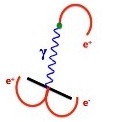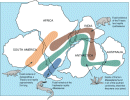Alexander Vilenkin “All the evidence we have..."
Moderators: kiore, Blip, The_Metatron
•
48 posts
• Page 1 of 3 • 1, 2, 3
Alexander Vilenkin “All the evidence we have..."
A religious friend of mine recently posted this article from Uncommon Descent on his Facebook page.
http://www.uncommondescent.com/intellig ... beginning/
Now, I'm only vaguely aware of Dr. Vilenkin's work, but based on what I do now, it seems likely that a hefty amount of information is being left out of these quotes. i was just curious to see if anyone could see the New Scientist article that it references, or maybe just has some further information that I can take back to show that Dr. Vilenkin is not, in fact, providing support for the Kalam cosmological argument here.
P.S. I wasn't really sure where to put this thread. I hope this is the right place. It seems like a physics-related question.
http://www.uncommondescent.com/intellig ... beginning/
Now, I'm only vaguely aware of Dr. Vilenkin's work, but based on what I do now, it seems likely that a hefty amount of information is being left out of these quotes. i was just curious to see if anyone could see the New Scientist article that it references, or maybe just has some further information that I can take back to show that Dr. Vilenkin is not, in fact, providing support for the Kalam cosmological argument here.
P.S. I wasn't really sure where to put this thread. I hope this is the right place. It seems like a physics-related question.
- Stormcrow
- THREAD STARTER
- Posts: 196
- Country: U.S.A.

Re: Alexander Vilenkin “All the evidence we have..."
This is a rather awkward conflation of poor semantics and deliberate misrepresentation of scientific research. The notion that scientists are acknowledging magical creation by virtue of having used the word "creation" in their dialog is an example of ID apologetics at it's shoddiest.
The central tenet of Intelligent Design is that in lieu of a scientific explanation, the answer must be "magic." If science has shown us anything over the millennia, it's that each and every claim of "magic" has invariably been shown to be the result of natural causes.
The central tenet of Intelligent Design is that in lieu of a scientific explanation, the answer must be "magic." If science has shown us anything over the millennia, it's that each and every claim of "magic" has invariably been shown to be the result of natural causes.
It's the duty of a Scientist to investigate the unexplained; not to explain the uninvestigated.
- Landrew
- Name: greg p
- Posts: 782
Re: Alexander Vilenkin “All the evidence we have..."
Vilenkin has a "universe from nothing" model.
I can't find an online copy at the moment, but I've got a paper copy somewhere. I don't recall it saying in there that it needed an external entity to kick it off
I can't find an online copy at the moment, but I've got a paper copy somewhere. I don't recall it saying in there that it needed an external entity to kick it off
A soul in tension that's learning to fly
Condition grounded but determined to try
Can't keep my eyes from the circling skies
Tongue-tied and twisted just an earthbound misfit, I
Condition grounded but determined to try
Can't keep my eyes from the circling skies
Tongue-tied and twisted just an earthbound misfit, I
-

twistor59 - RS Donator
- Posts: 4966


Re: Alexander Vilenkin “All the evidence we have..."
There are lots of strange and erroneous claims there.
No information is retained through into the next cycle. It's an etch-a-sketch ending, so the question of order and disorder is a category error.
Disorder increases with time. So following each cycle, the universe must get more and more disordered. But if there has already been an infinite number of cycles, the universe we inhabit now should be in a state of maximum disorder.
No information is retained through into the next cycle. It's an etch-a-sketch ending, so the question of order and disorder is a category error.
I'm not an atheist; I just don't believe in gods :- that which I don't belong to isn't a group!
Religion: Mass Stockholm Syndrome
Learn Stuff. Stuff good. https://www.coursera.org/
Religion: Mass Stockholm Syndrome
Learn Stuff. Stuff good. https://www.coursera.org/
-

Spearthrower - Posts: 33854
- Age: 48

- Country: Thailand
Re: Alexander Vilenkin “All the evidence we have..."
Rule of thumb: Don't trust the portrayal of valid science manufactured on uncommondescent. Creationist quotemining is the rule, not the exception.
Half-Life 3 - I want to believe
-

Rumraket - Posts: 13264
- Age: 43
Re: Alexander Vilenkin “All the evidence we have..."
There's a great interview with him here http://www.thoughtcast.org/science/the- ... ly-topics/
A most evolved electron.
-

Animavore - Name: The Scribbler
- Posts: 45108
- Age: 45


Re: Alexander Vilenkin “All the evidence we have..."
Spearthrower wrote:There are lots of strange and erroneous claims there.Disorder increases with time. So following each cycle, the universe must get more and more disordered. But if there has already been an infinite number of cycles, the universe we inhabit now should be in a state of maximum disorder.
No information is retained through into the next cycle. It's an etch-a-sketch ending, so the question of order and disorder is a category error.
It's also contradicted by empirical evidence. A chaotic mix of broken rock is washed into rivers by rainfall, and then sorted into orderly layers of sand, silt and gravel.
It's the duty of a Scientist to investigate the unexplained; not to explain the uninvestigated.
- Landrew
- Name: greg p
- Posts: 782
Re: Alexander Vilenkin “All the evidence we have..."
Animavore wrote:There's a great interview with him here http://www.thoughtcast.org/science/the- ... ly-topics/
Just listened to it. Good stuff. I like how the interviewer asked him what the equation was that described the beginning of the universe.
A soul in tension that's learning to fly
Condition grounded but determined to try
Can't keep my eyes from the circling skies
Tongue-tied and twisted just an earthbound misfit, I
Condition grounded but determined to try
Can't keep my eyes from the circling skies
Tongue-tied and twisted just an earthbound misfit, I
-

twistor59 - RS Donator
- Posts: 4966


Re: Alexander Vilenkin “All the evidence we have..."
"All the evidence we have says that the universe had a beginning." – Alexander Vilenkin
"[The Borde-Guth-Vilenkin theorem] has been used by William Lane Craig to argue that the universe itself had to have a beginning. We saw that cosmologists I contacted, including Vilenkin, Carroll, and Aguirre, all of whom have published works on the subject, agreed that no such conclusion is warranted."
(Stenger, Victor J. The Fallacy of Fine-Tuning: Why the Universe is not Designed for Us. Amherst, NY: Prometheus, 2011. p. 145)
Are there two Vilenkins or is there one schizophrenic Vilenkin?
"[The Borde-Guth-Vilenkin theorem] has been used by William Lane Craig to argue that the universe itself had to have a beginning. We saw that cosmologists I contacted, including Vilenkin, Carroll, and Aguirre, all of whom have published works on the subject, agreed that no such conclusion is warranted."
(Stenger, Victor J. The Fallacy of Fine-Tuning: Why the Universe is not Designed for Us. Amherst, NY: Prometheus, 2011. p. 145)
Are there two Vilenkins or is there one schizophrenic Vilenkin?

"Perception does not exhaust our contact with reality; we can think too." – Timothy Williamson
-

Teuton - Posts: 5461

Re: Alexander Vilenkin “All the evidence we have..."
No, it's merely equivocation on the use of the word 'universe', such as I have repeatedly exposed.
- hackenslash
- Name: The Other Sweary One
- Posts: 22910
- Age: 54

- Country: Republic of Mancunia
Alexander Vilenkin “All the evidence we have..."
Perhaps we should invent a word which limits its definition to the observable part of the universe to avoid the problem.
The "observerse" maybe?
The "observerse" maybe?

"...religion may attract good people but it doesn't produce them. And it draws in a lot of hateful nutjobs too..." AronRa
-

Precambrian Rabbi - Posts: 1591

- Country: Greenandpleasantland

Re: Alexander Vilenkin “All the evidence we have..."
I tend to employ 'cosmos' to observe this distinction, although semantically the two words are actually indistinguishable. It does negate the need for the excessively cumbersome 'that which arose from the big bang', though.
- hackenslash
- Name: The Other Sweary One
- Posts: 22910
- Age: 54

- Country: Republic of Mancunia
Re: Alexander Vilenkin “All the evidence we have..."
hackenslash wrote:No, it's merely equivocation on the use of the word 'universe', such as I have repeatedly exposed.
I don't think so.
"Perception does not exhaust our contact with reality; we can think too." – Timothy Williamson
-

Teuton - Posts: 5461

Re: Alexander Vilenkin “All the evidence we have...
Precambrian Rabbi wrote:Perhaps we should invent a word which limits its definition to the observable part of the universe to avoid the problem.
The "observerse" maybe?
A soul in tension that's learning to fly
Condition grounded but determined to try
Can't keep my eyes from the circling skies
Tongue-tied and twisted just an earthbound misfit, I
Condition grounded but determined to try
Can't keep my eyes from the circling skies
Tongue-tied and twisted just an earthbound misfit, I
-

twistor59 - RS Donator
- Posts: 4966


Re: Alexander Vilenkin “All the evidence we have..."
Teuton wrote:"All the evidence we have says that the universe had a beginning." – Alexander Vilenkin
"[The Borde-Guth-Vilenkin theorem] has been used by William Lane Craig to argue that the universe itself had to have a beginning. We saw that cosmologists I contacted, including Vilenkin, Carroll, and Aguirre, all of whom have published works on the subject, agreed that no such conclusion is warranted."
(Stenger, Victor J. The Fallacy of Fine-Tuning: Why the Universe is not Designed for Us. Amherst, NY: Prometheus, 2011. p. 145)
Are there two Vilenkins or is there one schizophrenic Vilenkin?
"I contacted Aguirre and Vilenkin, the latter whom I have known professionally for many years. I greatly admire the work of each, which will be referred to often on these pages. I first asked Vilenkin if Craig's statement is accurate. Vilenkin replied:
'I would say this is basically correct, except the words “absolute beginning” do raise some red flags. The theorem says that if the universe is everywhere expanding (on average), then the histories of most particles cannot be extended to the infinite past. In other words, if we follow the trajectory of some particle to the past, we inevitably cometo a point where the assumption of the theorem breaks down—that is, where the universe is no longer expanding. This is true for all particles, except perhaps a set of measure zero. In other words, there may be some (infinitely rare) particles whose histories are infinitely long.'
…
I then asked Vilenkin, “Does your theorem prove that the universe must have had a beginning?” He immediately replied,
'No. But it proves that the expansion of the universe must have had a beginning. You can evade the theorem by postulating that the universe was contracting prior to some time.'
Vilenkin further explained,
'For example, Anthony in his work with Gratton, and Carroll and Chen, proposed that the universe could be contracting before it started expanding. The boundary then corresponds to the moment (that Anthony referred to as t = 0) between the contraction and expansion phases, when the universe was momentarily static. They postulated in addition that the arrow of time in the contracting part of space-time runs in the opposite way, so that entropy grows in both time directions from t = 0.'
…
I also checked with Caltech cosmologist Sean Carroll, whose recent book From Eternity to Here provides an excellent discussion of many of the problems associated with early universe cosmology. Here was his response:
'I think my answer would be fairly concise: no result derived on the basis of classical spacetime can be used to derive anything truly fundamental, since classical general relativity isn't right. You need to quantize gravity. The BGV [Borde, Guth, Vilenkin] singularity theorem is certainly interesting and important, because it helps us understand where classical GR breaks down, but it doesn't help us decide what to do when it breaks down. Surely there's no need to throw up our hands and declare that this puzzle can't be resolved within a materialist framework. Invoking God to fill this particular gap is just as premature and unwarranted as all the other gaps.'
(Stenger, Victor J. The Fallacy of Fine-Tuning: Why the Universe is not Designed for Us. Amherst, NY: Prometheus, 2011. pp. 127-30)
"Perception does not exhaust our contact with reality; we can think too." – Timothy Williamson
-

Teuton - Posts: 5461

Re: Alexander Vilenkin “All the evidence we have..."
But of course you don't, my dear, because you get all your information about the universe from the lint in your umbilicus (or, more accurately by light-years, from the umbilici of others who also think that the colour of said lint constitutes fucking knowledge).
Who knows what the fuck you think? It isn't yours anyway...
- hackenslash
- Name: The Other Sweary One
- Posts: 22910
- Age: 54

- Country: Republic of Mancunia
Re: Alexander Vilenkin “All the evidence we have..."
Teuton wrote:Teuton wrote:"All the evidence we have says that the universe had a beginning." – Alexander Vilenkin
"[The Borde-Guth-Vilenkin theorem] has been used by William Lane Craig to argue that the universe itself had to have a beginning. We saw that cosmologists I contacted, including Vilenkin, Carroll, and Aguirre, all of whom have published works on the subject, agreed that no such conclusion is warranted."
(Stenger, Victor J. The Fallacy of Fine-Tuning: Why the Universe is not Designed for Us. Amherst, NY: Prometheus, 2011. p. 145)
Are there two Vilenkins or is there one schizophrenic Vilenkin?
"I contacted Aguirre and Vilenkin, the latter whom I have known professionally for many years. I greatly admire the work of each, which will be referred to often on these pages. I first asked Vilenkin if Craig's statement is accurate. Vilenkin replied:
'I would say this is basically correct, except the words “absolute beginning” do raise some red flags. The theorem says that if the universe is everywhere expanding (on average), then the histories of most particles cannot be extended to the infinite past. In other words, if we follow the trajectory of some particle to the past, we inevitably cometo a point where the assumption of the theorem breaks down—that is, where the universe is no longer expanding. This is true for all particles, except perhaps a set of measure zero. In other words, there may be some (infinitely rare) particles whose histories are infinitely long.'
…
I then asked Vilenkin, “Does your theorem prove that the universe must have had a beginning?” He immediately replied,
'No. But it proves that the expansion of the universe must have had a beginning. You can evade the theorem by postulating that the universe was contracting prior to some time.'
Vilenkin further explained,
'For example, Anthony in his work with Gratton, and Carroll and Chen, proposed that the universe could be contracting before it started expanding. The boundary then corresponds to the moment (that Anthony referred to as t = 0) between the contraction and expansion phases, when the universe was momentarily static. They postulated in addition that the arrow of time in the contracting part of space-time runs in the opposite way, so that entropy grows in both time directions from t = 0.'
…
I also checked with Caltech cosmologist Sean Carroll, whose recent book From Eternity to Here provides an excellent discussion of many of the problems associated with early universe cosmology. Here was his response:
'I think my answer would be fairly concise: no result derived on the basis of classical spacetime can be used to derive anything truly fundamental, since classical general relativity isn't right. You need to quantize gravity. The BGV [Borde, Guth, Vilenkin] singularity theorem is certainly interesting and important, because it helps us understand where classical GR breaks down, but it doesn't help us decide what to do when it breaks down. Surely there's no need to throw up our hands and declare that this puzzle can't be resolved within a materialist framework. Invoking God to fill this particular gap is just as premature and unwarranted as all the other gaps.'
(Stenger, Victor J. The Fallacy of Fine-Tuning: Why the Universe is not Designed for Us. Amherst, NY: Prometheus, 2011. pp. 127-30)
Thank you for demonstrating my point with laser-like precision with quotes supporting my assessment from the horse's fucking mouth.
Go learn some fucking physics. Or wallow in your ignorance thereof and continue to demonstrate that your brand of lack-of-thought is utterly useless in elucidating reality. I really don't care.
- hackenslash
- Name: The Other Sweary One
- Posts: 22910
- Age: 54

- Country: Republic of Mancunia
Re: Alexander Vilenkin “All the evidence we have..."
Think about the alternative to: "the universe had a beginning."
"The universe has always existed."
Does this statement make sense? How could infinite regression possibly work?
If time and space themselves were created at the time of the Big Bang, it solves the problem quite nicely.
"The universe has always existed."
Does this statement make sense? How could infinite regression possibly work?
If time and space themselves were created at the time of the Big Bang, it solves the problem quite nicely.
It's the duty of a Scientist to investigate the unexplained; not to explain the uninvestigated.
- Landrew
- Name: greg p
- Posts: 782
Re: Alexander Vilenkin “All the evidence we have..."
What infinite regression (aside from the fact that your question is a textbook argumentum ad ignorantiam)? What justification is there for supposing that time and space were created at the time of the big bang (indeed, can you actually formulate a coherent event prior to the big bang that doesn't include time)?
It always amuses me that those who haven't spent any time studying or keeping up with developments in cosmology wheel out this trope about time starting at the big bang, despite the fact that the conclusion is held to be flawed by the two physicists who derived the conclusion in the first place.
It always amuses me that those who haven't spent any time studying or keeping up with developments in cosmology wheel out this trope about time starting at the big bang, despite the fact that the conclusion is held to be flawed by the two physicists who derived the conclusion in the first place.
- hackenslash
- Name: The Other Sweary One
- Posts: 22910
- Age: 54

- Country: Republic of Mancunia
Re: Alexander Vilenkin “All the evidence we have..."
hackenslash wrote:What infinite regression (aside from the fact that your question is a textbook argumentum ad ignorantiam)? What justification is there for supposing that time and space were created at the time of the big bang (indeed, can you actually formulate a coherent event prior to the big bang that doesn't include time)?
It always amuses me that those who haven't spent any time studying or keeping up with developments in cosmology wheel out this trope about time starting at the big bang, despite the fact that the conclusion is held to be flawed by the two physicists who derived the conclusion in the first place.
The argumentum was absent my post, but the ignorantiam was evident in yours. I was asking a question, not making a claim. If something is claimed to have "always existed" the problem of infinite regression always applies. If something is claimed to have a beginning, the question of what happened before the beginning always applies. If, as some theoretical physics suggests, that time did not exist before the big bang, it offers a possible solution.
It's the duty of a Scientist to investigate the unexplained; not to explain the uninvestigated.
- Landrew
- Name: greg p
- Posts: 782
48 posts
• Page 1 of 3 • 1, 2, 3
Who is online
Users viewing this topic: No registered users and 1 guest